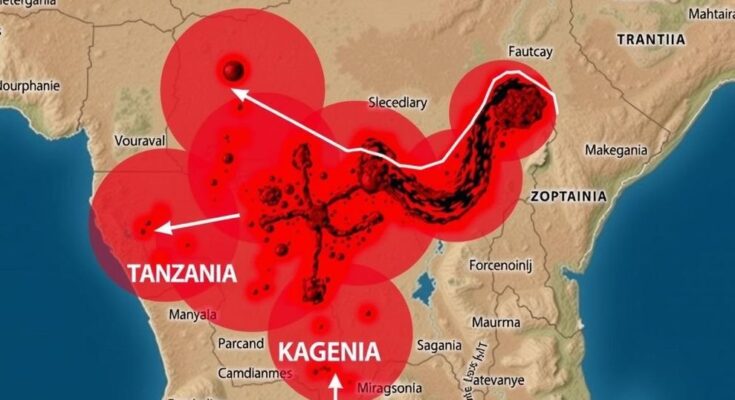The WHO has reported a suspected outbreak of the Marburg virus in Tanzania’s Kagera region, resulting in at least eight deaths and nine suspected cases. Dr. Tedros cautioned that while the risk of regional spread remains high, the global risk is considered low. There are no confirmed travel restrictions at this time, but increased surveillance is expected.
The World Health Organization (WHO) has issued a warning regarding a suspected outbreak of the Marburg virus in the Kagera region of north-west Tanzania, where at least eight fatalities have been reported. Over the past five days, nine suspected Marburg cases have been documented, and experts anticipate that additional cases may emerge as surveillance intensifies. Marburg is a highly infectious disease exhibiting symptoms akin to those of Ebola, including fever, muscle aches, diarrhea, vomiting, and severe hemorrhaging, which can lead to death.
Although Tanzania experienced its first outbreak of this virus in March 2023, resulting in six deaths over a two-month period, authorities have yet to confirm this latest incident. The WHO has identified several patients, including healthcare professionals, who are currently undergoing monitoring. Rapid response teams have been dispatched to assist in identifying and controlling the outbreak.
The WHO has indicated that the risk of Marburg spreading within the region remains high due to Kagera’s status as a transit hub, with significant cross-border movement to neighboring countries. However, Dr. Tedros Adhanom Ghebreyesus, the WHO chief, has reassured that no travel or trade restrictions with Tanzania are currently recommended. The global risk of an international spread of the virus is assessed as low at this time. With Marburg typically responsible for the deaths of approximately 50% of those infected, the need for vigilance remains critical as no specific treatment or vaccine exists, although clinical trials are ongoing.
Marburg virus fever is a severe and often fatal illness caused by the Marburg virus, which is part of the same family as the Ebola virus. The disease is characterized by high mortality rates and is primarily transmitted to humans by fruit bats. Following a significant outbreak in Tanzania’s Bukoba district earlier in 2023, this newly suspected outbreak in Kagera has raised concerns regarding containment and surveillance efforts in the region. The WHO plays a crucial role in monitoring and responding to such outbreaks to mitigate public health risks.
In summary, the suspected Marburg virus outbreak in Tanzania’s Kagera region, resulting in eight confirmed deaths and nine suspected cases, underscores the importance of effective surveillance and response mechanisms. The WHO continues to monitor the situation, emphasizing that no trade or travel restrictions are necessary at this point. With the possibility of further cases emerging, ongoing vigilance is essential to prevent the spread of this dangerous virus.
Original Source: www.bbc.com




